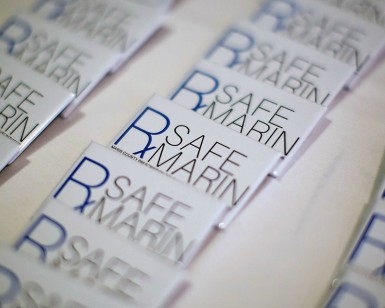San Rafael, CA – Doctors and other clinicians in Marin County are writing fewer prescriptions for opioid pain killers and subsequently seeing fewer opioid overdoses, according to new findings from Marin County Public Health.
 The grassroots RxSafe Marin coalition has made a large impact on reducing prescription drug abuse since it was formed in 2014.
The grassroots RxSafe Marin coalition has made a large impact on reducing prescription drug abuse since it was formed in 2014. Opioid prescribing in Marin has decreased 48 percent since 2014, when safe prescribing was made a local public health priority. In 2013, 39 Marin County residents died from overdoses, mostly due to prescription opioids. “Losing someone every one to two weeks was our call to action,” said Dr. Matt Willis, the County’s Public Health Officer.
By 2018, there were 28 fatal drug overdoses countywide.
“We’re approaching pain differently,” said Dr. Mitesh Popat, CEO of Marin Community Clinics. “We’ve found that most people with chronic pain do better, in the long run, without opioids. Being part of a countywide response has helped the whole medical community set a new bar.”
In 2014 the Marin County Department of Health and Human Services, along with health care providers, law enforcement officials and community members formed RxSafe Marin, a coalition dedicated to reducing harm from prescription drug abuse and saving lives. RxSafe Marin created safe opioid prescribing guidelines in collaboration with local hospitals and the San Francisco Marin Medical Society, coupled with intensive community education about the potential harms of opioids.
The reduction in prescriptions, as well as increases in the amount of safely disposed medications, has resulted in fewer opioids in the community.
While RxSafe Marin celebrated the drops in overdoses and prescribing, the coalition also shared some alarming new trends in fentanyl use, during a presentation to the Board of Supervisors on August 20 in recognition of International Overdose Awareness Day and Opioid Awareness Month.
Fentanyl, a potent opioid that is generally manufactured and sold illegally, is now the leading cause of overdoses nationally and County data is reflecting that. Of the 28 overdoses in 2018, five were fentanyl-related, as many as the previous five years combined.
Given the growing numbers of overdoses related to illicit or non-prescription opioids, RxSafe Marin is shifting its focus to concentrate on support and access to treatment for those struggling with addiction.
“Prescribing fewer opioids is key, but it’s not enough,” said Donna Reeve, an RxSafe Marin member. “Anybody can be at risk of addiction from opiates prescribed and used over too long a period of time. As the mom of someone in recovery, I know how much works needs to be done. At this point, we need to prioritize addiction treatment.”
Opioid addiction is treatable with medications and counseling support, and one new program is working to get people the help they need even faster.
Marin County Public Health, Emergency Medical Services, and HHS’ Behavioral Health and Recovery Services are partnering to use 9-1-1 records to identify overdose events and connect survivors with substance-use treatment. Since starting the program in July 2018, the number of patients connected to treatment within one week of a nonfatal overdose has increased from 9 to 21 percent.
“People can be more open to getting help for addiction after a near miss event,” said Kim Bowman, Marin County Emergency Medical Services Director. “This collaboration allows us to reach out to offer that support to those who are at highest risk.”
Another strategy that RxSafe Marin is employing is promoting the availability and use of Narcan, the medicine that can reverse the effects of an opioid overdose almost immediately. On July 30, RxSafe Marin hosted a conference for 120 law enforcement officers and 74 search-and-rescue volunteers who were eager to learn more about trends in addressing the national opioid epidemic. On July 20, 84 local pharmacists participated in a training on the importance of furnishing Narcan, also known by its generic name, naloxone. The drug is now available at pharmacies without a physician’s prescription, courtesy of state legislation passed in 2014.
“We’ve made a lot of progress by joining forces across the county,” Willis said. “We’ll only reach our goal of zero overdose deaths by working together. We see every overdose as preventable.”